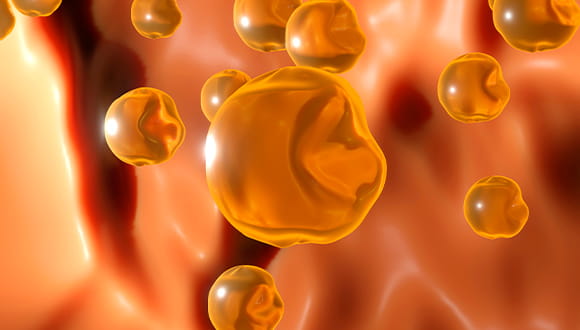You've likely heard the warnings about high cholesterol. Specifically, how having it can increase a person's risk of heart disease.
But cholesterol in and of itself isn't bad — quite the opposite, actually. Your body needs it.
Cholesterol becomes a problem when you have too much of it in your bloodstream, which is almost always preventable.
"Your liver produces cholesterol. In fact, it actually produces all the cholesterol you need. The tricky part is that our diet and lifestyle habits can also influence our cholesterol levels," says Dr. Joshua Septimus, associate professor of clinical medicine and medical director of Houston Methodist Primary Care Group Same Day Clinics.
And while your body has a way of dealing with extra cholesterol floating around in your bloodstream, it can't always effectively handle excess amounts of it.
What is cholesterol and how does it work?
Cholesterol is a waxy substance your body relies on to:
- Maintain the structural integrity of your cells
- Produce hormones
- Make vitamin D
"Because of the many important roles it plays, cholesterol needs to travel throughout your body. It does so via your bloodstream, moving as part of larger molecules called lipoprotein particles," says Dr. Septimus.
High cholesterol can be caused by having more lipoproteins in your bloodstream than your body needs, which, in turn, increases the chance of cholesterol accumulating and damaging the arteries.
What are the symptoms of high cholesterol?
Ultimately, high cholesterol can lead to the formation of fatty deposits (called plaque) in your arteries. This buildup causes them to harden and narrow, affecting blood flow — which is called atherosclerosis.
"If your cholesterol is high, you likely won't have symptoms until it's too late. Up to 75% of individuals with heart disease experience heart attack as their first symptom. However, your doctor can identify high cholesterol levels using a blood test," adds Dr. Septimus.
Even though you don't feel the effects, over time this reduced blood flow can alsowly lead to coronary artery disease and cerebral artery disease — with symptoms and complications including:
- Chest pain
- Shortness of breath
- Heart attack
- Stroke
Atherosclerosis can also lead to peripheral artery disease, which can cause leg pain when walking.
Additionally, having excess lipoprotein in your bloodstream can further lead to any plaque that's present becoming unstable.
"If unstable plaque detaches from artery walls, it can lead to the formation of a blood clot, which, depending on where the clot forms, can quickly lead to heart attack or stroke," warns Dr. Septimus.
5 reasons your cholesterol may be high
So...what actually causes high cholesterol?
Dr. Septimus says high cholesterol is caused by a variety of lifestyle factors — most of which are avoidable:
1. Your diet
"The standard American diet is full of refined, processed foods, and these types of foods significantly contribute to high cholesterol levels," warns Dr. Septimus. "These are the foods you find in the inside aisles of grocery stores, such as packaged goods, frozen meals (although frozen fruit and veggies are fine!) and commercially baked snacks, as well as things like bacon and cured meats."
Instead, Dr. Septimus recommends focusing on eating "real foods" — such as vegetables, fruits and unprocessed meats.
2. Your waistline
Central obesity — which is an accumulation of fat in the abdomen/belly — is associated with a number of health conditions, including:
- Insulin resistance
- Increased systemic inflammation
- Abnormal levels of cholesterol
"Importantly, central obesity is a marker for increased inflammation within the body, which can result in cholesterol buildup in your blood vessels," warns Dr. Septimus. "It's also a marker for unstable plaque. Remember, once plaque becomes unstable, the risk of stroke and heart attack increase."
Eating a well-balanced diet and getting plenty of exercise are the important first steps to losing belly fat and maintaining a healthier weight.
3. Your activity level
"Regular physical activity and exercise tends to reduce insulin resistance and inflammation, which helps reduce cholesterol buildup in your blood vessels," explains Dr. Septimus.
It's recommended that adults get about 150 minutes of moderate-intensity exercise every week. This might sound like a lot, but it works out to just about 30 minutes per day.
4. Whether you smoke
Among the many negative effects of cigarette smoke is the damage it causes to your blood vessels, which can, in turn, increase your risk of developing cholesterol-related plaque buildup.
"Smoking causes inflammation and damage to your blood vessels, leading to unstable cholesterol plaque and, ultimately, increases your risk of plaque rupture," explains Dr. Septimus.
5. Things you can't control, like your age
While some risk factors of high cholesterol are avoidable, a few aren't. Namely, increasing age.
"As you age, you lose lean muscle mass. This leads to you becoming naturally more insulin resistant, which increases plaque instability and worsens your lipoprotein particle number, which increases cholesterol deposition in your blood vessels," warns Dr. Septimus.
Additionally, high cholesterol can be caused by a rare genetic disorder called familial hypercholesterolemia. It can also develop as a complication of other health conditions, particularly type 2 diabetes.
"If you have one or more of these risk factors, it doesn't mean you will develop high cholesterol, but it does mean you'll need to be sure you're adopting and maintaining the healthy lifestyle behaviors that reduce your risk," adds Dr. Septimus.
The healthy lifestyle behaviors that can help you avoid high cholesterol and its consequences include:
- Avoiding processed/packaged foods and eating a diet rich in vegetables and fruit
- Exercising regularly
- Taking steps to avoid other health conditions, such as type 2 diabetes and obesity
- Losing weight, if you're overweight
- Stopping smoking, if you smoke


